Related Research Articles
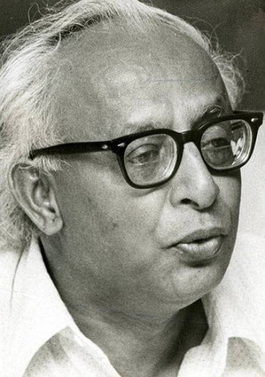
Mysore Narasimhachar Srinivas was an Indian sociologist and social anthropologist. He is mostly known for his work on caste and caste systems, social stratification, Sanskritisation and Westernisation in southern India and the concept of 'dominant caste'. He is considered to be one of the pioneering personalities in the field of sociology and social anthropology in India as his work in Rampura remains one of the early examples of ethnography in India. That was in contrast to most of his contemporaries of the Bombay School, who focused primarily on a historical methodology to conduct research, mainly in Indology. He also founded the Department of Sociology at the Delhi School of Economics, University of Delhi in 1959.

Irawati Karve was a pioneering Indian sociologist, anthropologist, educationist and writer from Maharashtra, India. She was one of the students of G.S. Ghurye, founder of Indian Sociology & Sociology in India. She has been claimed to be the first female Indian Sociologist.

Elphinstone College is one of the constituent colleges of Dr. Homi Bhabha State University, a state cluster university. Established in 1856, it is one of the oldest colleges in Mumbai. It played a major role in shaping and developing the educational landscape of the city. It also played a pivotal role in the inception of the University of Mumbai.
Virachand Raghavji Gandhi was a Jain scholar who represented Jainism at the first World Parliament of Religions in 1893. A barrister by profession, he worked to defend the rights of Jains, and wrote and lectured extensively on Jainism, other religions, and philosophy.

Ram Sharan Sharma was an Indian historian and Indologist who specialised in the history of Ancient and early Medieval India. He taught at Patna University and Delhi University (1973–85) and was visiting faculty at University of Toronto (1965–1966). He also was a senior fellow at the School of Oriental and African Studies, University of London. He was a University Grants Commission National Fellow (1958–81) and the president of Indian History Congress in 1975. It was during his tenure as the dean of Delhi University's History Department that major expansion of the department took place in the 1970s. The creation of most of the positions in the department were the results of his efforts. He was the founding Chairman of the Indian Council of Historical Research (ICHR) and a historian of international repute.
Irving Louis Horowitz was an American sociologist, author, and college professor who wrote and lectured extensively in his field, and in his later years came to fear that it risked being seized by left-wing ideologues. He proposed a quantitative index for measuring a country's quality of life, and helped to popularize "Third World" as a term for the poorer nations of the Non-Aligned Movement. He was considered by many to be a neoconservative, although he maintained that he had no political adherence.
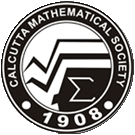
The Calcutta Mathematical Society (CalMathSoc) is an association of professional mathematicians dedicated to the interests of mathematical research and education in India. The Society has its head office located at Kolkata, India.
Kerala Mathematical Association is an organisation established in 1962 to serve the mathematical community comprising students, teachers and researchers inside Kerala and outside. It has a membership of around 1000 of which nearly half are life members and about 300 are from outside Kerala and outside India.
Krishna Kumar is an Indian intellectual and academician, noted for his writings on the sociology and history of education. His academic oeuvre has drawn on multiple sources, including the school curriculum as a means of social inquiry. His work is also notable for its critical engagement with modernity in a colonized society. His writings explore the patterns of conflict and interaction between forces of the vernacular and the state. As a teacher and bilingual writer, he has developed an aesthetic of pedagogy and knowledge that aspires to mitigate aggression and violence. In addition to his academic work, he writes essays and short stories in Hindi, and has also written for children. He has taught at the Central Institute of Education, University of Delhi, from 1981 to 2016. He was also the Dean and Head of the institution. From 2004 to 2010, he was Director of the National Council of Educational Research and Training (NCERT), an apex organization for curricular reforms in India. He was awarded the Padma Shri by the President of India in 2011.
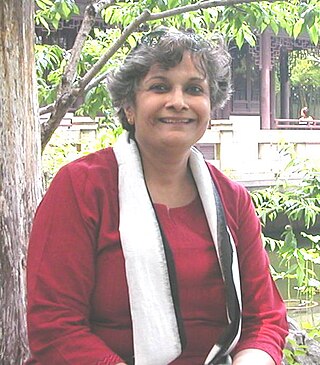
Sujata Patel is an Indian sociologist, currently holding the position of National Fellow at the Indian Institute of Advanced Study.
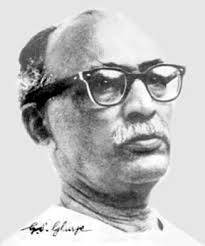
Govind Sadashiv Ghurye was a pioneering Indian academic who was a professor of sociology. In 1924, he became the second person to head the Department of Sociology at the University of Bombay. And, is widely regarded as the founder of Indian Sociology & Sociology in India.
Professor D. N. Dhanagare was an Indian sociologist who specialised in farmers' movements and rural sociology.
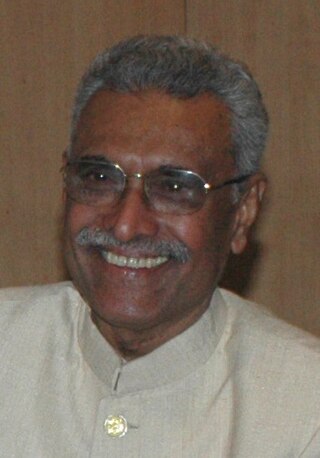
Tharailath Koshy Oommen is an Indian sociologist, author, teacher, and Professor Emeritus at the Centre for the Study of Social Systems, Jawaharlal Nehru University. He was awarded Padma Bhushan, the third highest Indian civilian award in 2008 for his services to the fields of education and literature by the President of India.
Girishwar Misra is a social scientist, psychologist and author from India.

Anupam Sen is a Bangladeshi author, sociologist, and social activist. He is currently serving as the vice-chancellor of Premier University, Chittagong. He was awarded Ekushey Padak in 2014 by the Government of Bangladesh.
Ramkrishna Mukherjee was a scientist at the Indian Statistical Institute, Kolkata, President of the Indian Sociological Society (1973–75) and recipient of the Indian Sociological Society's Lifetime Achievement Award in 2005.
Akshay Ramanlal Desai was an Indian sociologist, Marxist and a social activist. He was Professor and Head of the Department of Sociology in University of Bombay in 1967. He is particularly known for his work Social Background of Indian Nationalism in which he offered a Marxist analysis of the genesis of Indian nationalism making use of history, which set a path to build socialism in India.
Shyama Charan Dube (S.C.Dube) was an Indian anthropologist, sociologist, and former president of the Indian Sociological Society from 1975 to 1976.
S. Devadas Pillai was an Indian sociologist.
J K Bajaj is a founding trustee and director of the Center for Policy Studies, Chennai. He is also a member of the Indian Council of Social Science Research, of the National Council of Rural Institutes and of the advisory board, Council for Scientific and Industrial Research. J K Bajaj holds a PhD degree in theoretical physics from Panjab University and has worked extensively in the scientific and technological tradition of India, Indian ideas and institutions and the religious demography of India.
References
- ↑ "Indian Sociological Society turns 60". The Hindu. 2011-12-15. Retrieved 2013-03-31.
- 1 2 Publication of new journal called Sameeksha, insoso.org, accessed 14 sept 2021.
- 1 2 3 "Sociology conference at JNU today". The Times of India . 2011-12-11. Archived from the original on 2013-04-11. Retrieved 2013-03-31.
- ↑ "Remembering Professor Arvind M. Shah, a Genial Doyen of Sociology", The Wire, 21 Sep 2020.